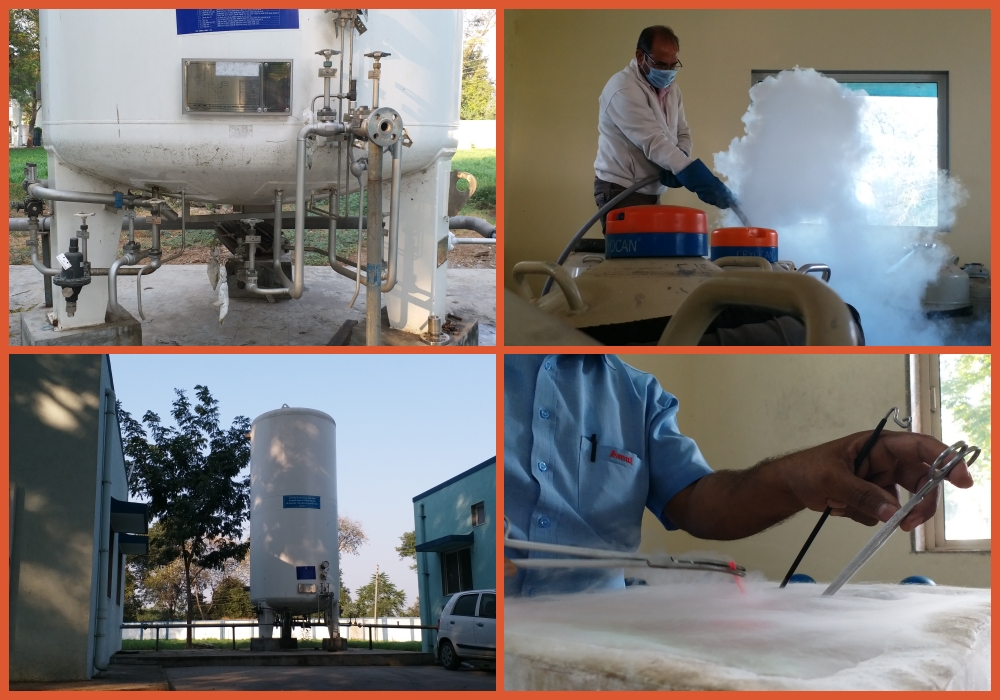Anand (Gujarat): Amul dairy, which introduced artificial insemination to improve the livestock of milch animals, has played a pioneering role in the white revolution in the country for the last 69 years.
Under this system expert of Amul can preserve and transport dozes of animal semen in extremely low temperature. Talking to ETV Bharat Amul dairy managing director Amit Vyas said the system of artificial insemination has been in place since 1951 by which improved breed of milch cattle is being developed in the most effective way. Earlier, when the technology of refrigeration was not available Amul used ice to keep the stock of semen under low temperature. Later, Amul started its research and development centre at Ode in Anand district which developed the flawless cold supply chain.

Amul readies 20,000 dozes of artificial insemination at the Ode research centre where over 150 numbers of high-quality bulls have been kept. Of them, semen is collected from 50 bulls resulting in 20,000 doses for artificial insemination. Annually, over 50 lakh dozes are prepared. In order to keep them preserved in extremely low temperature, Amul uses liquid nitrogen.
A stock of 16,000 litres of liquid nitrogen is kept
Amul has developed a system of maintaining a stock of 16,000 litres of liquid nitrogen at its centre in Ode. The semen dozes are kept in 350 litre small tanks for over a month. Amul uses its cold supply chain to connect with its network of 1,200 milk cooperatives through 91 routes covering 16,000 kilometres. During the supply, about 20 per cent of liquid nitrogen gets evaporated. Four tanks of liquid nitrogen are kept with every route of the cold supply chain. The entire artificial insemination process is digitally monitored. A temperature of minus 196 degrees C is maintained throughout the route from the research centre to each of the milk cooperative society with the help of liquid nitrogen. After the stock of semen reaches the cooperative society, it is stored in a tank of three litres which is then taken to the remotest village by the dairy employee ensuring that the minimum temperature is maintained.
Amul dairy uses 7 lakh litres of liquid nitrogen to maintain the cold supply chain.
The process is divided in two parts
Amul deploys 29 of its experts on the cold supply chain management system to serve 1,200 cooperative societies with 50 lakh doses of semen for artificial insemination every year. In the second stage, the semen is distributed by the employees of the dairy to individual milk producer farmer in the remotest village. The average normal temperature of semen is 37 degrees C which is kept at minus 196 degrees C during transportation. Before the semen is implanted, its temperature is brought back to its original 37 degrees. There are 1200 employees of Amul dairy who carry out the artificial insemination.
Amul’s expertise and experience of maintaining a cold supply chain are going to prove extremely useful in the distribution of coronavirus vaccine in coming days. Amul already transports veterinary vaccine for animals under extremely low temperature to its 14 veterinary centres from where the veterinary doctors carry the vaccine in a smaller container of 3-litre capacity. Amul supplies three to four lakh doses of the vaccine every year to serve over three to four lakh animals linked to 200 cooperative societies. With such an experience, Amul’s cold supply chain would prove very useful in transporting vaccine for coronavirus in the days to come.
Also Read: Celebrating Dr. Verghese Kurien's birthday known as Milkman of India



